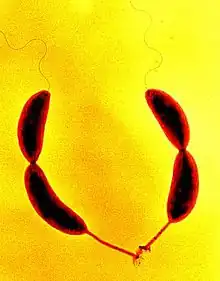Caulobacter
| Caulobacter | |
|---|---|
 | |
| Caulobacter crescentus | |
| Scientific classification | |
| Kingdom: | |
| Phylum: | |
| Class: | |
| Order: | |
| Family: | |
| Genus: | Caulobacter Poindexter 1964 |
| Species | |
|
C. crescentus | |
Caulobacter is a genus of Gram-negative bacteria in the class Alphaproteobacteria.[1] Its best-known member is Caulobacter crescentus, an organism ubiquitous in freshwater lakes and rivers; many members of the genus are specialized to oligotrophic environments.
Interactions with other organisms
Pathogenicity
Although Caulobacter is not commonly appreciated as a cause of human diseases, Caulobacter isolates have been implicated in a number of cases of recurrent peritonitis in peritonial dialysis patients.[2][3] One study has identified the species C. crescentus and C. mirare as the cause of a disease of the moth Galleria mellonella; the absence of identified distinct virulence factors in C. mirare may suggest that other Caulobacter species have pathogenic potential.[4]
References
- ↑ Poindexter, JS (Sep 1964). "Biological Properties and Classification of the Caulobacter Group". Microbiol. Mol. Biol. Rev. 28 (3): 231–95. doi:10.1128/mmbr.28.3.231-295.1964. PMC 441226. PMID 14220656.
- ↑ Justesen, Ulrik; Holt, Hanne; et al. (April 2007). "Report of the First Human Case of Caulobacter sp. Infection". Journal of Clinical Microbiology. 45 (4): 1366–1369. doi:10.1128/JCM.02380-06. PMC 1865810. PMID 17267638.
- ↑ Rosado, Consolación; Manzanedo, Rosario; et al. (December 2015). "Recurrent Peritonitis Due to Caulobacter crescentus as a Rare Cause of Dialysis Technique Failure". Peritoneal Dialysis International. 35 (7): 766–767. doi:10.3747/pdi.2014.00293. PMC 4690638. PMID 26703852.
- ↑ Moore, Gabriel; Gitai, Zemer (12 March 2020). "Both clinical and environmental Caulobacter species are virulent in the Galleria mellonella infection model". PLOS ONE. 15 (3): e0230006. Bibcode:2020PLoSO..1530006M. doi:10.1371/journal.pone.0230006. PMC 7067423. PMID 32163465.